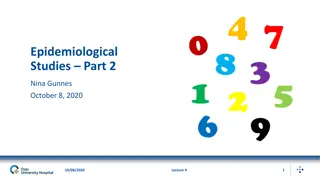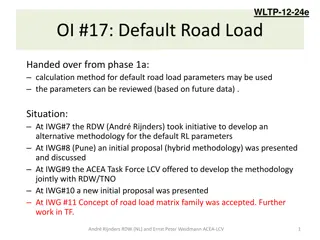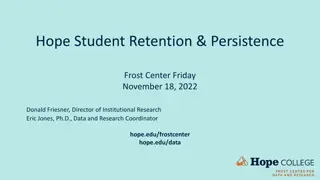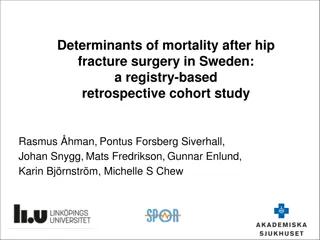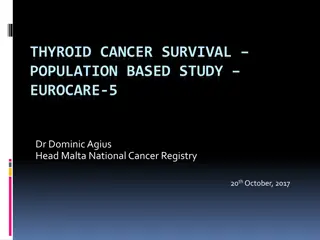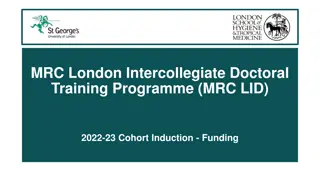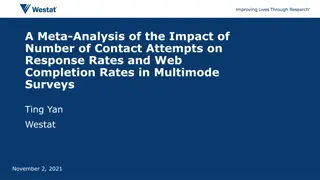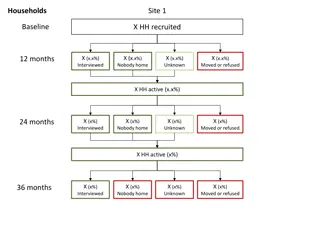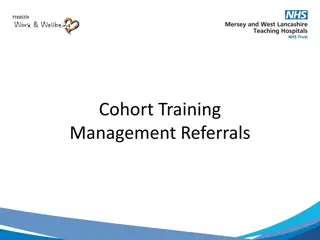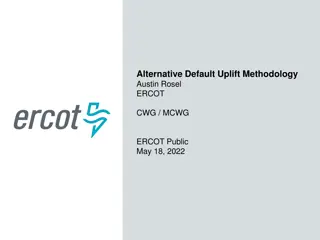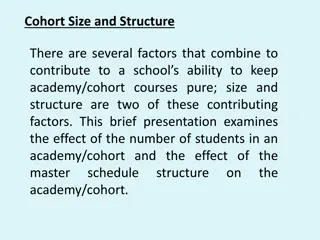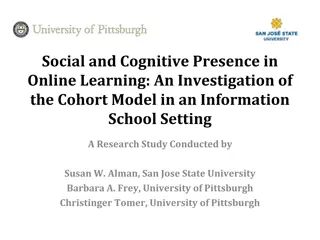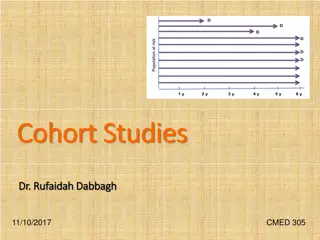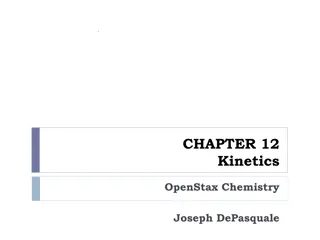IET Design Camp Cohort Meeting: Research and Assess Phase Highlights
Engage in the IET Design Camp Cohort Meeting to delve into the Research and Assess Phase, where you will explore key takeaways, participate in team activities, and prepare for individual assignments. The agenda includes introductory discussions, cohort activities, and wrap-ups to enhance your unders
0 views • 10 slides
Overview of Cohort Studies in Epidemiology
Cohort studies are a type of observational study where a group of healthy subjects is followed over time to investigate relationships between exposures and outcomes. They provide valuable insights into disease development and risk factors, offering advantages like assessing multiple exposures and en
0 views • 21 slides
- Development of Alternative Methodology for Default Road Load Parameters in Vehicle Testing
- The initiative to develop an alternative methodology for default road load parameters in vehicle testing was led by RDW and ACEA. The process involved multiple meetings, discussions, and proposals, resulting in the acceptance of the concept of a road load matrix family. Various x-factors were adop
3 views • 22 slides
Computation of Machine Hour Rate: Understanding MHR and Overhead Rates
Computation of Machine Hour Rate (MHR) involves determining the overhead cost of running a machine for one hour. The process includes dividing overheads into fixed and variable categories, calculating fixed overhead hourly rates, computing variable overhead rates, and summing up both for the final M
5 views • 18 slides
Hope Student Retention & Persistence Analysis Overview
Analysis conducted by the Frost Center at Hope College on student retention and persistence, focusing on demographic variables and involvement in various activities. The retention rates by cohort and class year are outlined, along with explanations on retention calculations and measurements. The dat
1 views • 29 slides
New Mexico Graduation Rates 2018-2019 Analysis
The New Mexico Public Education Department utilizes a Shared Accountability Model to calculate graduation rates, considering students' time enrolled at each school. Graduation rates are calculated after a two-step verification process, with on-time graduates in focus. Historical data shows a positiv
1 views • 13 slides
Recovery of Willful Default in Mortgages through NAB
This content discusses the National Accountability Ordinance (NAO) of 1999 and the concept of willful default in the context of mortgages. It covers the need for recovery, the definition of default, and key definitions outlined in NAO. The focus is on eradicating corruption and holding individuals a
1 views • 40 slides
ERCOT Default Uplift and Payment Procedures
ERCOT's default uplift and payment procedures involve handling short-paying invoice recipients, implementing payment plans, and collecting total short pay amounts from QSEs and CRRAHs. Default uplift invoices may be issued after 90 days of a short pay, with a maximum cap of $2.5 million per monthly
0 views • 7 slides
Determinants of Mortality After Hip Fracture Surgery in Sweden: A Registry-Based Retrospective Cohort Study
Hip fractures in Sweden pose significant challenges due to increased mortality rates. A retrospective cohort study analyzed data from the Swedish PeriOperative Registry to identify factors influencing patient outcomes post-surgery, highlighting the importance of various perioperative variables on lo
0 views • 32 slides
Corporate Bond Ratings and Credit Risk in International Finance
Corporate bond ratings provide signals on default probability, impacting borrowing costs. Higher ratings signify lower risk and interest rates. Credit spreads measure the difference between risky bonds and risk-free assets, with risk-free assets like US Treasury bonds seen as default-free. The longe
1 views • 19 slides
Thyroid Cancer Survival Trends in Europe: Eurocare-5 Study
A population-based study on thyroid cancer survival rates in Europe over 25 years reveals insights by sex, country, age, period, and histological type. The study shows increased incidence but stable mortality trends, with varying survival rates based on region, gender, and histology types like papil
0 views • 14 slides
MRC.London Intercollegiate Doctoral Training Programme 2022-23 Cohort Induction and Funding Overview
MRC.London Intercollegiate Doctoral Training Programme (MRC.LID) offers funding for the 2022-23 cohort, including travel and conference allowances, flexible funding options, tuition fees coverage, stipends, and Research Training Support Grants (RTSG). The programme provides detailed information on a
0 views • 26 slides
Impact of Number of Contact Attempts on Response Rates in Multimode Surveys
This meta-analysis investigates the effects of the number of contact attempts on response rates and web completion rates in multimode surveys. Benefits of multimode surveys include improving coverage, increasing response rates, reducing costs, and enhancing measurement accuracy by utilizing multiple
0 views • 27 slides
Unit Rates in Mathematics
Explore the concept of unit rates in mathematics, where you will learn how to determine unit rates of given quantities and solve word problems involving unit rates. Discover key vocabulary, such as ratio, rate, and terms, and understand the difference between ratio and rates. Delve into examples and
0 views • 22 slides
Exchange Rate Behavior with Negative Interest Rates: Early Observations by Andrew K. Rose
In this study, Andrew K. Rose examines the exchange rate behavior in economies with negative nominal interest rates, focusing on the impact and implications of such rates on exchange rates. The findings suggest limited observable consequences on exchange rate behavior, with similarities in shocks dr
0 views • 42 slides
Graduation Rates in High Schools
Graduation rates measure the percentage of students who complete high school within 4 or 5 years. This information is crucial for identifying schools needing support and improvement. The adjusted cohort graduation rates take into account various factors like transfers, emigration, and deaths. Compli
1 views • 10 slides
A Typical PPSA Scheme by Professor Hugh Beale
This comprehensive outline delves into the key aspects of a typical PPSA scheme, covering creation, attachment, perfection, registration, priority issues, rights and duties pre-default, remedies on default, and more. It explores the scope of application, quasi-securities, registration of similar-loo
0 views • 16 slides
Household and Cohort Nets Recruitment and Activity Patterns
Explore the recruitment and activity trends of households and cohort nets across multiple sites over 36 months. The data showcases baseline recruitment, interview rates, active participant percentages, and movements/refusals among households and cohort nets. Visuals provided offer insights into the
0 views • 6 slides
Liabilities of Directors under Companies Act, 2013
Director's liabilities under the Companies Act, 2013 include definitions of directors, shadow directors, officers, and those in default. Responsibility for default and potential prosecutions for wrongful actions are discussed. Changes in definitions and concepts are highlighted to illustrate the leg
0 views • 37 slides
Cohort Training Management Referrals: Streamlining Processes for Employee Health
Cohort is a web-based Occupational Health software system that enhances efficiency by automating processes, reducing errors, and increasing productivity. It enables Occupational Health Departments to transition to a paper-light or paper-free environment. Management referrals are made to assess and s
0 views • 22 slides
Aggressive vs. Passive Communication Styles in Cognitive Behavioral Therapy
Explore the impact of communication styles on outcomes in cognitive behavioral therapy. Learn to identify default communication styles and strategies to promote assertive communication. Discover the benefits of replacing default styles with assertiveness for better interpersonal interactions.
0 views • 4 slides
Use of Credit Default Swaps (CDS) by Investment Funds
Presentation at the ESMA workshop discussed the potential benefits and costs of using Credit Default Swaps (CDS) by investment funds. It highlighted the various uses of CDS, including risk management, alternative liquidity, and investment strategies. Evidence shows that a small percentage of UCITS f
0 views • 6 slides
Analysis of Default Uplift Methodology Changes in ERCOT
This document delves into the impact of changes to the Default Uplift Methodology in ERCOT, focusing on the removal of CRR Auction activity and the multiplication of CRRs owned. It explores scenarios with varying multipliers at different levels, revealing potential implications for QSEs, CRRAHs, and
0 views • 10 slides
Modeling Complete and Incomplete Data in Database Systems
The discussion revolves around the partial-closed world assumption, contrasting incompleteness as default (IAD) with completeness as default (CAD). It delves into querying completeness reasoning, translating between CAD and IAD, and the implications of using IAD over CAD in database modeling. Variou
1 views • 13 slides
Brady Bonds and Valuation Methodologies in International Finance
Exploring Brady Bonds introduced by Nicholas Brady in response to default crises in Latin American countries, focusing on valuation methodology, country ratings, and decision-making on purchasing Par or Discount Bonds in Mexico and Venezuela. Topics include cash flows, probability of default, discou
0 views • 14 slides
Analysis of Political and Economic Factors in the U.S. Mortgage Default Crisis
This research paper by Justin Wolfers delves into the correlations between voting patterns, constituent interests, and economic conditions amidst the U.S. Mortgage Default Crisis. It highlights how legislators respond to constituent interests, including voting for bills that impact mortgage default
0 views • 24 slides
Adventist Health Studies Contributions & Collaborations Overview
Adventist Health Studies have made significant contributions to understanding the health and longevity advantages of Seventh-day Adventists, particularly focusing on vegetarian diets and cardiovascular health. With a history spanning over 57 years and various cohort studies, these studies have provi
1 views • 12 slides
Cohort Default Rates in Federal Student Loans
This document discusses the importance of protecting the cohort default rate in educational institutions for financial well-being of students and safeguarding federal funding. It explains the cohort default rate equation and provides insights into the cohort year 2013 data. The visuals and informati
0 views • 26 slides
Cohort Analysis in Educational Research
Cohort analysis in educational research involves studying a group of students meeting specific criteria to analyze trends over time. Baseline data is crucial for comparison, and it helps institutions track student persistence, retention, and attrition rates. By establishing baselines, institutions c
0 views • 12 slides
Impact of Cohort Size and Structure on Academic Pathways
This presentation explores how cohort size and structure influence academic pathways in schools. It delves into the effects of student numbers and master schedule structures on cohort courses, using examples and visuals to illustrate the concepts. From analyzing a Linked Learning Pathway with 120 st
0 views • 9 slides
Interest Rates and Real Growth in Finance
Explore the dynamics of interest rates, real growth theory, inflation's impact on purchasing power, the Fisher equation, and the theory of interest by J.R. Hicks. Learn about ex-ante vs. ex-post real interest rates and the term premium in fixed income markets. Understand how credit spreads and defau
0 views • 22 slides
Enhancing Personalized Search with Cohort Modeling
Personalized search faces challenges due to the reliance on personal history, leading to a cold start problem. Cohort modeling offers a solution by grouping users with shared characteristics to improve search relevance. By leveraging cohort search history and collaboration, this approach aims to enh
0 views • 21 slides
Exploration of Social and Cognitive Presence in Online Learning Cohorts
Investigation conducted at San Jose State University and University of Pittsburgh compares student satisfaction in cohort and non-cohort programs. Cohorts offer a sense of community, belonging, and shared learning experiences. Limited empirical evidence exists on cohort benefits in online education.
0 views • 16 slides
Cohort Studies: Design, Objectives, and Application
Cohort studies involve following a group of individuals over time to study the effects of a particular factor on outcomes such as disease development. This presentation covers the basics of cohort design, different types of cohort studies, advantages, disadvantages, and measures of disease frequency
0 views • 44 slides
AVC2CSU Proposed Cohort Pathway Program Overview
Proposed AVC2CSU cohort pathway program aims to provide seamless transition for AS-T and AA-T degree students to obtain guaranteed admission into a CSU within two years. The program objectives include enhancing student success, increasing retention rates, and reducing degree completion timeframes th
1 views • 11 slides
Move On When Ready College and Career Cohort Information
The FCS-GTC College and Career Cohort offers students a specialized Move On When Ready opportunity with Gwinnett Technical College. Students can earn high school and college credits in four areas of concentration, leading to certification in high-demand career fields. Admissions are open to 11th and
0 views • 5 slides
Chemical Reaction Rates and Expressions
Chemical reactions occur at different rates, with reactions being classified as fast or slow. The study of reaction rates, known as Kinetics, involves examining factors that affect rates and controlling them. Rate expressions are mathematical representations of reaction rates, typically expressed in
0 views • 48 slides
Cohort Effects and Changing Distributions in Health Studies
This study by Adam Hulm explores cohort effects in health status, analyzing age-related trajectories and longitudinal data to investigate how different birth cohorts are exposed to unique environments affecting health outcomes. Utilizing a multilevel model, the research incorporates cohort effects a
0 views • 22 slides
PBIS Minnesota Spring Training Year 2 SRIP Cohort
Supporting and Sustaining PBIS Implementation, TFI Progress, SRIP Cohort progress, Stay Connected to the PBIS Community. Schools Can Apply for Cohort 17. South Regional Contacts. Learn more about PBIS Minnesota projects and initiatives
0 views • 17 slides
Determinants of Islamic Peer-to-Peer Lending Default in Indonesia
Research explores the impact of COVID-19 on Islamic P2P lending default rates in Indonesia and identifies contributing factors. It investigates how green Sukuk can address environmental risks and analyzes the behavior of Indonesian stock indices during the pandemic.
0 views • 20 slides

